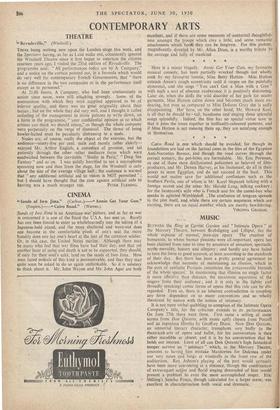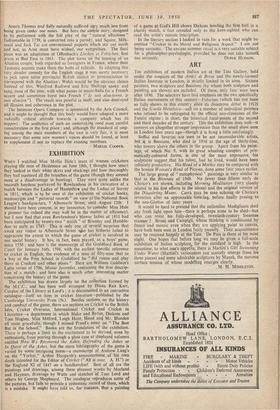MUSIC
BETWEEN the Ring at Covent Garden and " Intimate Opera " at the Mercury Theatre, between Brobdignag and Lilliput, lies the whole expanse of normal, pan-size opera The creation of humanists, to whom human passions were all-important, opera has been claimed from time to time by amateurs of sensation, spectacle, myth, morality, history and allegory ; and hardly any have failed to turn the form to good account, at least according to the standards of their day. But there has been a pretty general agreement to acknowledge that necessity of maintaining an illusion, which in the eyes of aesthetic Puritans constitutes the irrecoverable blemish of the whole species. In maintaining that illusion no single factor is more effective than distance, the maximum separation of the singers from their audience ; and it is only in the lighter and (broadly speaking) comic forms of opera that this rule can be dis- regarded. Even so, there is an inherent contradiction in coupling any form dependent on so many conventions and so. .wholly theatrical by nature with the notion of intimacy.
It is not mere verbal quibbling to complain of the Intimate Opera Company's title, for the criticism extends to its performances. On June 27th there were three. First came a setting of some scenes from Don Quixote, with music aptly chosen from Purcell and an ingenious libretto by Geoffrey Dunn. Now Don Quixote, an immortal literary character, transplants very badly to the theatricals arts of opera and ballet, for his conversation is then either inaudible or absent, and it is by his conversation that he holds our interest. Least of all can Don Quixote's high fantastical temper survive an " intimacy " which, in the Mercury Theatre, amounts to having him mistake Maritornes for Dulcinea under our very noses and lunge at windmills in the front row of the auditorium. Roy Ashton's playing of the part would certainly have been more convincing at a distance, though the combination of extravagant action and florid singing demanded of him would present a probleni to even the most accomplished singer. Eric Shilling's Sancho Panza, though calculated for a larger scene, was excellent in characterisation both vocal and dramatic. Arne's Thomas and Sally naturally suffered %/cry much less from being given under our noses. But here the simple story, designed to be performed with the full play of thp " natural affections " fashionable in 1759, is converted into a parody, and Squire, Milk- maid and Jack Tar are conventional puppets which stir our mirth and not, as Arne must have wished, our sympathies. The final piece was an adaptation of Offenbach's Lischen et Fritzchen, first given at Bad Ems in 1863. The plot turns on the meeting of an Alsatian couple, both regarded as foreigners in France, where their Teutonic accents make them the butts of ridicule. In adapting this Very slender comedy for the English stage it was surely necessary to pick upon some provincial British dialect or pronunciation to correspond with the Alsatian ' • Welsh would be the obvious choice Instead of this, Winifred Radford and Eric Shillings spoke and sang, most of the time, with what passes in music-halls for a French accent and sometimes burst into ;French ("Je suis alsacienne, je sills alsacien"). The result was painful in itself, and also destroyed all illusion and coherence in the plot. The Intimate Opera Company is sponsored by the Arts Council, and it might be thought that this body would have adopted a more radically critical attitude towards a company which has its support. The aesthetics of such an undertaking need most careful :onsideration in the first place ; and, although the standard of sing- ing among the male members of the cast is very fair, it is most necessary that some new women's voices should be found, at least to supplement if, not to replace the existing members.
MARTIN COOPER.















































 Previous page
Previous page